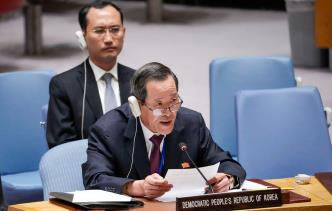
Around 30,000 North Koreans have made it to the South, where they are welcomed with free housing, inexpensive medical care and training for the job market
Some North Korean defectors have appeared in a propaganda video, released by Pyongyang, denouncing South Korea
SEOUL: When North Korean dictator Kim Jong Un, with a broad smile on his face, strode across the border into the South onApril 27 to meet South Korean President Moon Jae-in, hopes of peace were on many South Korean minds. But those who had defected from the North did not share their optimism.
Kim Young-hee, 54, who fled to South Korean in 2015, said she felt frustrated that the issue of human rights in the North was not raised at the meeting between the two leaders.
“I turned off the TV immediately after the two grasped hands and took a ceremonial photo,” said Kim, who works at an LG TV plant in Gumi, about 280 kilometers south of Seoul.
“I felt they met just for a political show, not for genuinely improving the lives of the people. They seemed not to care about North Korean human rights issues and those suffering in poverty.”
She expressed distrust over the left-leaning Moon administration, which puts a top priority on mending ties with the communist North.
Amid hugs and smiles, Moon held a surprise summit with Kim on May 26 on the northern side of Panmunjom in the Demilitarized Zone after US President Donald Trump abruptly canceled the planned summit with the North Korean leader in Singapore on June 12.
“Many North Korean defectors, including me, feel insecure about the government’s reconciliatory move toward Pyongyang, as the Kim Jong Un regime could demand Seoul repatriate North Korean defectors under the name of inter-Korean reconciliation,” she added.
The defector referred to the repatriation of 22 North Koreans to the North in 2008 during the presidency of Roh Moo-hyun, for which Moon was chief of staff.
On Feb. 8, 2008, 22 North Koreans came across the Northern Limit Line, or NLL, in the West Sea, on two rubber boats. They were rescued by the South Korean Navy, but the Roh administration sent them back to the North within 13 hours.
North Korean human rights activists in Seoul said that the defectors had been forcibly repatriated at a time when of pressure not to intimidate the North before the second inter-Korean summit talks between Roh and Kim Jong Il, the father of Kim Jong Un.
“When I was in the North, I heard the 22 defectors were executed upon arrival,” Kim said. “I was horrified. I think that kind of thing can happen to me and others.”
Such anxiety over forcible repatriation of North Korean defectors has surfaced in recent weeks after a local current affairs TV program reported a dozen North Korean waitresses, who fled to the South two years ago, had been duped into leaving by South Korea’s spy agency, National Intelligence Service (NIS).
It was reported by JTBC, a cable news network, on May 10 that some of the waitresses had been tricked by their manager, identified by his surname Heo, to defect to the South, at the bidding of the NIS. The move was thought to be to help then conservative ruling party of former President Park Geun-hye win favor with voters in the run-up to parliamentary elections.
Following the JTBC report, Kim, who defected to the South in 2007, posted a video appealing for rescue should she be kidnapped by the North.
“This is the first preparation for things that could happen to me in the near future. There is not a single reason why I return to the North of my free will,” Kim said in the 150-minute video on YouTube. “If such a thing happens, I ask the people of the Republic of Korea carry out a rescue campaign for me.”
Some North Korean defectors have appeared in a propaganda video, released by Pyongyang, denouncing South Korea.
“We could vanish here without a trace and be forcibly returned to the North, but we’re not 100 percent sure if the Moon government would save or protect us,” said the activist, who was repatriated to the North when she was staying in China.
“I was sent to forced labor camps in the North. The memory of torture, rape, deliberate starvation and executions in the camps still gives me horrible nightmares.”
Around 30,000 North Koreans have made it to the South, where they are welcomed with free housing, inexpensive medical care and training for the job market.
Defection has become more difficult, according to anti-North Korean activists, since Kim Jong Un took the helm of the Stalinist regime shown in the figure of 1,100 North Koreans arriving in the South, a third of the annual number before he came to power.










